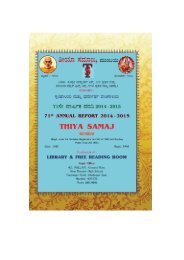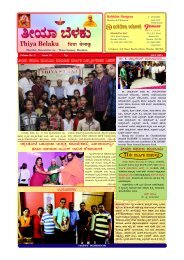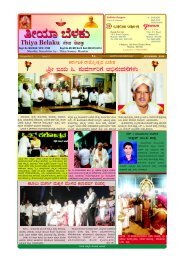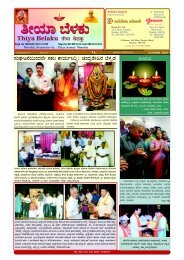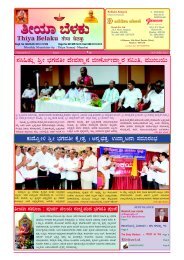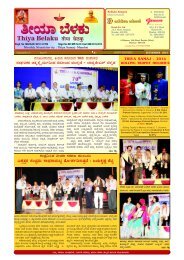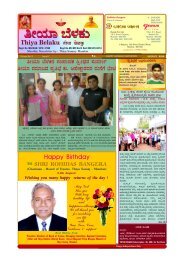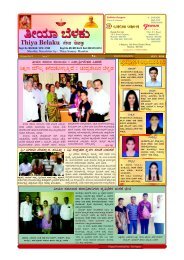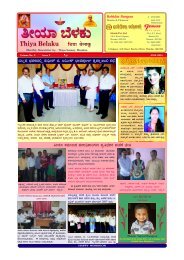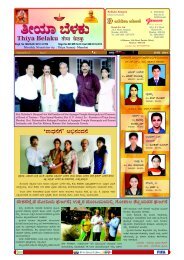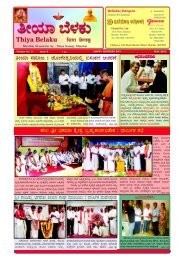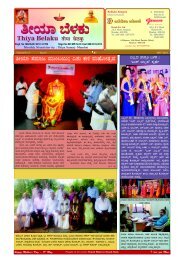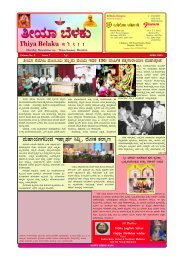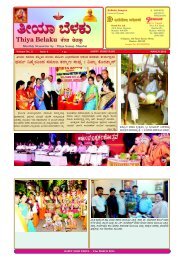You also want an ePaper? Increase the reach of your titles
YUMPU automatically turns print PDFs into web optimized ePapers that Google loves.
=jûK 2<br />
Editorial<br />
Living a life with motive is intentional and living<br />
in a society without ego is called an Art of Living.<br />
A long tradition in many cultures has evolved of<br />
dividing life into two parts : in the first phase,<br />
from childhood to middle adulthood, we are<br />
becoming individuals, learning the way of the<br />
world and asserting ourselves in the demand of<br />
family, work and society. In the second phase,<br />
which begins according to JUNG with the middle<br />
crisis, we begin turning inward, re connecting<br />
with the center of our being. In the first phase we<br />
build and develop our ego and in the second<br />
phase we transcend and surrender it.<br />
Imagine an onion. If you were to peel one layer<br />
after another, all you get is more peel because<br />
there is no core. There is no such thing as ‘I’<br />
either. What we refer to as the ego is the pride you<br />
feel about yourself. Every person has ego about<br />
something – work, success, family and fame. Ego<br />
creates a distinction between one self and other.<br />
Everyone is born without a name, but after birth,<br />
a person identifies with a name. He forgets he is<br />
in the world to serve humanity.<br />
The two main causes of ego remains knowledge<br />
and wealth. A person who has these two<br />
components, but is also involved in spiritual<br />
practice such a ritualistic worship, reading<br />
scriptures, embarking on pilgrimages, chanting a<br />
mantra or meditation, has much less ego.<br />
Depending on thoughts and emotions, our ego<br />
could lead to anger, hatred, belief in one’s own<br />
prowess and the desire to constantly strive to<br />
acquire personal happiness. The more the ego you<br />
have, the more loss and unhappiness you<br />
encounter. If a proud, beautiful woman grows old<br />
or is ill and her beauty fades away, she will be<br />
unhappy. If a rich man conscious of his wealth<br />
and power, suddenly loses that wealth, he will be<br />
miserable. Sometimes psychological unhappiness<br />
due to ego is more painful than physical distress.<br />
I did or It was me who did or I am the maker…..<br />
is ego but without eliminating it, one cannot<br />
obtain true knowledge. Theoretical knowledge is<br />
useful if utilized<br />
to improve one.<br />
If this is not done,<br />
that know-ledge<br />
turns into ego<br />
and leads the<br />
intellect astray.<br />
Please try to<br />
eliminate ego,<br />
Start with<br />
becoming aware<br />
and owing up to<br />
your defects; stop pointing out other’s defects.<br />
Inculcate humility towards people and value<br />
everything as God’s creation. Develop an attitude<br />
of learning and listening. In learning, one becomes<br />
aware that, I know nothing; by listening to others,<br />
we enhance our patience, love respect and<br />
tolerance; these reduce our ego.<br />
When a person expects or demands respect or<br />
praise, it only fosters his ego. Talking incessantly<br />
about oneself, one’s family or one’s happiness or<br />
sorrows shows an attachment to the body. But not<br />
talking about oneself, attachment to the body<br />
automatically reduces. These steps reduce ego.<br />
Watch how you react to situations. Do you say<br />
things you regret later? Learn to control reactions<br />
and introspect, instead.<br />
Selfishness is another common source of ego,<br />
whether physical, oral or psychological. In speech,<br />
avoid words like ‘I’ me, mine to reduce the ego.<br />
Do actions for others and not just for yourself.<br />
Playing with Children helps, as you forget your<br />
status and your ego! Think of others, not of<br />
yourself. Ask yourself the eternal question, who<br />
am I? The answer lies within you. Look within<br />
and you will wholeheartedly say, “I am no one.”<br />
Sridhar S. Suvarna<br />
Editor-in-Chief<br />
THIYA BELAKU<br />
...............................................<br />
<strong>Nov</strong>., <strong>2013</strong> | Vol. 2 Issue No.2<br />
Editor :<br />
Sridhar S. Suvarna<br />
M. 808090 4895<br />
Jt. Editor :<br />
Babu Belchada<br />
Krishnappa Billawa<br />
Advisory Board :<br />
Rohidas Bangera<br />
Ravi Manjeshwar<br />
Ail Babu<br />
Narayan Salian<br />
Appunchi K. Bangera<br />
Hema S. Amin<br />
Finance :<br />
Ramesh Ullal<br />
Sunder Ail<br />
Advertising :<br />
Thimmappa Bangera<br />
Purandar Salian<br />
Distribution:<br />
Harish Kunder<br />
Mohan B. M.<br />
Mangalore Rep:<br />
Premchand<br />
Vaman Idya<br />
Rohini B.M.<br />
Rajendra Prasad Kateel<br />
Udupi Rep.:<br />
Umnath Kaup<br />
Kasargod Rep.:<br />
Vasudev Uppala<br />
Haridas Bolar, Kumbla<br />
Bhaskar Kasargod<br />
Publisher :<br />
Chandrashekar B.<br />
Co-ordinating Office :<br />
<strong>Thiya</strong> Samaj, 4 ‘Pallavi’,<br />
Pant Nagar North,<br />
Ghatkopar (E),<br />
Mumbai - 400 075.<br />
Tel.: 2501 6092<br />
E-mail:<br />
thiyasridhar@rediffmail.com<br />
Word Press (pdf file) :<br />
<strong>Thiya</strong>jyoti.wordpress.com<br />
^;kj




